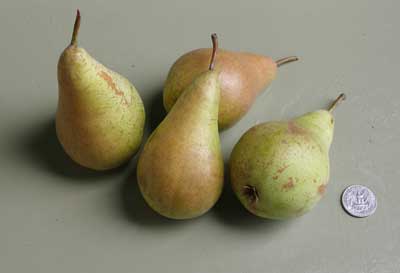Balsam apple. A small, cylindrical, knobbly, dark green vegetable of the gourd family with red flesh and a very bitter flavour. It lightens and turns yellow as it ripens. The bitterness can be reduced by salting before cooking or using in salads.
A name for wrasse. Ballan wrasse. A very bony fish which provides good flavour for fish soups.
Marie-Antoine Carême (1783-1833), the originator of classic French cookery, 'La Grande Cuisine' by organising the workings of the professional kitchen. He was known as the 'Chef to kings and the king of chefs'. He worked for George IV when he was Prince Regent, Baron de Rothschild, Czar Alexander and Napoleon. His name is attached to dishes made with truffles, foie gras, cockscombs and so on. Carême also means Lent. He is thought to have invented the toque, the traditional tall, white chef's hat.

An old French dessert pear, yellow russetted and with good flavour. It grows to about 90 mm (3½") in length, and is ready to pick from mid-October. It crops well.
A southern French name for a flat lobster. A variety of lobster with a flat tail, shaped somewhat like a slipper, which is the edible part. It makes a noise like a cricket. The Mediterranean slipper lobster is generally used for flavouring soups as it does not carry much meat. It is found in warm waters.
Marinades are used as a way of tenderising dry or tough meat and to add flavour. Foods cooked on a barbecue benefit from marinating in oil and acid of some sort. The oil adds moisture while the acid tenderises. Marinades comprise some sort of moisture, such as oil, vinegar or lemon juice, and any of a number of aromatics. Aromatic herbs should be of the stronger varieties, such as rosemary, thyme, bay or oregano. Milder herbs such as tarragon, chervil or parsley are better added at the end of cooking. There are also dry marinades and pastes which are rubbed into the surface of the foods. Using too much salt will mean that the moisture is drawn from the meat, rather defeating the object.